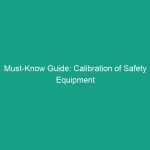Introduction
In the dynamic world of the hospitality industry, where the primary focus is on providing exceptional guest experiences, the significance of health, safety, and Environment (HSE) management cannot be overstated. Safety management in the hospitality industry is crucial not only for protecting employees and guests but also for ensuring the Sustainability and profitability of establishments. With various risks ranging from food Safety to workplace accidents, a comprehensive understanding of Safety protocols is essential. This article delves deep into the essential safety management practices that can help hospitality businesses avoid critical risks, demonstrating how a proactive approach to health and safety can enhance operational efficiency and customer satisfaction.
Understanding HSE in Hospitality
The hospitality industry encompasses a wide range of businesses, including hotels, restaurants, and event venues, all of which must adhere to stringent safety Regulations. At its core, HSE management involves identifying, assessing, and mitigating risks associated with workplace operations. The goal is to create a safe environment for employees and guests alike.
Effective safety management in the hospitality industry involves a combination of regulatory compliance, risk assessment, training, and continuous improvement. By integrating these elements, businesses can not only protect their workforce but also enhance their reputation and operational performance.
Regulatory Frameworks in the Hospitality Industry
Compliance with local, state, and federal regulations is a cornerstone of safety management in the hospitality industry. Various regulatory bodies govern the operational Standards for hospitality businesses, including the Occupational Safety and Health Administration (OSHA) in the United States and similar organizations worldwide.
These regulations cover a broad spectrum of health and safety issues, such as:
- Workplace safety standards
- Fire safety protocols
- Food safety regulations
- Employee health and wellness
Understanding these regulations is critical for management teams. Failing to comply can result in hefty fines, legal repercussions, and damage to a business’s reputation. Training employees on these regulations is equally important, ensuring that everyone understands their responsibilities and the proper Procedures to follow.
Key Areas of Focus in HSE Management
When implementing safety management in the hospitality industry, several key areas demand attention:
- Fire Safety: Establishing clear Evacuation Procedures and conducting regular fire drills are essential for ensuring that staff and guests know how to respond in an emergency.
- Food Safety: Proper food handling practices, regular inspections, and employee Training on hygiene standards are vital to prevent foodborne illnesses.
- Workplace Ergonomics: Addressing ergonomic risks can reduce the incidence of musculoskeletal disorders among employees, improving overall workplace efficiency.
- Crisis Management: Developing a crisis management plan helps businesses respond effectively to unforeseen events, such as natural disasters or health emergencies.
Best Practices for Safety Management in Hospitality Industry
Adopting Best Practices in safety management is essential for mitigating risks and enhancing Workplace Safety. Here are several recommended practices:
1. Conduct Regular Risk Assessments
Regular risk assessments are crucial for identifying potential Hazards in the workplace. This involves evaluating existing safety protocols and determining areas that require improvement. By conducting these assessments at least annually, businesses can proactively address risks before they escalate into critical incidents.
2. Implement Comprehensive Training Programs
Training is one of the most effective tools for ensuring safety management in the hospitality industry. Comprehensive training programs should cover all aspects of Workplace Safety, from fire drills to safe food handling. Engaging employees in interactive training sessions can enhance retention and ensure that everyone is well-prepared to handle emergencies.
3. Foster a Safety Culture
Creating a culture of safety within the organization encourages employees to prioritize safety in their daily tasks. Management should lead by example, demonstrating a commitment to safety that resonates throughout the workforce. Recognizing and rewarding Safe Practices can also motivate employees to adhere to safety protocols.
4. Utilize Technology for Safety Management
Technology can significantly enhance safety management in the hospitality industry. From automated fire alarm systems to software that tracks employee training, investing in technology can streamline safety processes. Additionally, using data analytics can help identify trends and areas for further improvement.
5. Develop an Emergency Response Plan
An effective emergency response plan is essential for any hospitality business. This plan should outline procedures for various scenarios, including Fires, medical emergencies, and natural disasters. Regular drills and updates to the plan ensure that employees are prepared to act quickly and efficiently in case of an emergency.
Case Studies: Learning from Success
Examining real-world examples of successful safety management in the hospitality industry can provide valuable insights. Here are two noteworthy case studies:
Case Study 1: Hotel XYZ
Hotel XYZ implemented a comprehensive safety management program that included regular risk assessments and employee training. After identifying a high risk of slips and falls in the kitchen, management introduced non-slip flooring and mandatory footwear policies. As a result, the hotel reported a 50% decrease in workplace accidents over the following year, demonstrating the effectiveness of proactive Safety Measures.
Case Study 2: Restaurant ABC
Restaurant ABC faced challenges related to food safety compliance. They invested in a robust training program for their staff, emphasizing the importance of food handling and hygiene. By adopting a strict checklist for food preparation and conducting regular audits, the restaurant not only improved compliance but also received positive feedback from health inspectors, leading to an enhanced reputation in the community.
Challenges in Implementing Safety Management
Despite the importance of safety management in the hospitality industry, several challenges can hinder effective implementation:
1. Employee Resistance
Some employees may resist new Safety Measures, viewing them as unnecessary or burdensome. To overcome this resistance, management should involve employees in the development of safety protocols and emphasize the Benefits of a safer workplace.
2. Resource Constraints
Many hospitality businesses operate on tight budgets, making it challenging to allocate resources to safety initiatives. However, investing in safety management can yield long-term savings by reducing accidents and associated costs.
3. Keeping Up with Regulations
The regulatory landscape is constantly evolving, and staying compliant can be challenging. Regular training and updates to policies are essential to ensure that staff are aware of the latest regulations.
Future Trends in Safety Management
The landscape of safety management in the hospitality industry is continually evolving. Here are some future trends to watch:
1. Increased Use of Technology
As technology continues to advance, the hospitality industry will increasingly adopt innovative solutions for safety management. Smart sensors, AI-driven analytics, and mobile apps for reporting Hazards can streamline processes and enhance safety compliance.
2. Greater Focus on Mental Health
Recognizing the importance of mental health in the workplace, businesses are beginning to implement strategies that support employee well-being. Training programs that address stress management and mental health awareness can contribute to a safer and more supportive work environment.
3. Sustainability and Safety Integration
With a growing emphasis on sustainability, hospitality businesses are increasingly integrating safety management with environmental practices. This includes ensuring that safety protocols align with green initiatives, such as waste reduction and energy efficiency.
Conclusion
Safety management in the hospitality industry is not merely a regulatory requirement; it is a fundamental aspect of providing a safe and enjoyable experience for guests and employees alike. By understanding the regulatory frameworks, implementing Best Practices, learning from successful case studies, and overcoming challenges, hospitality businesses can position themselves for success.
As the industry continues to evolve, staying abreast of future trends and investing in safety management will be crucial. Ultimately, a commitment to health and safety not only protects individuals but also enhances the overall success and sustainability of hospitality businesses. We encourage all stakeholders in the hospitality industry to prioritize safety management and take proactive steps to avoid critical risks.


